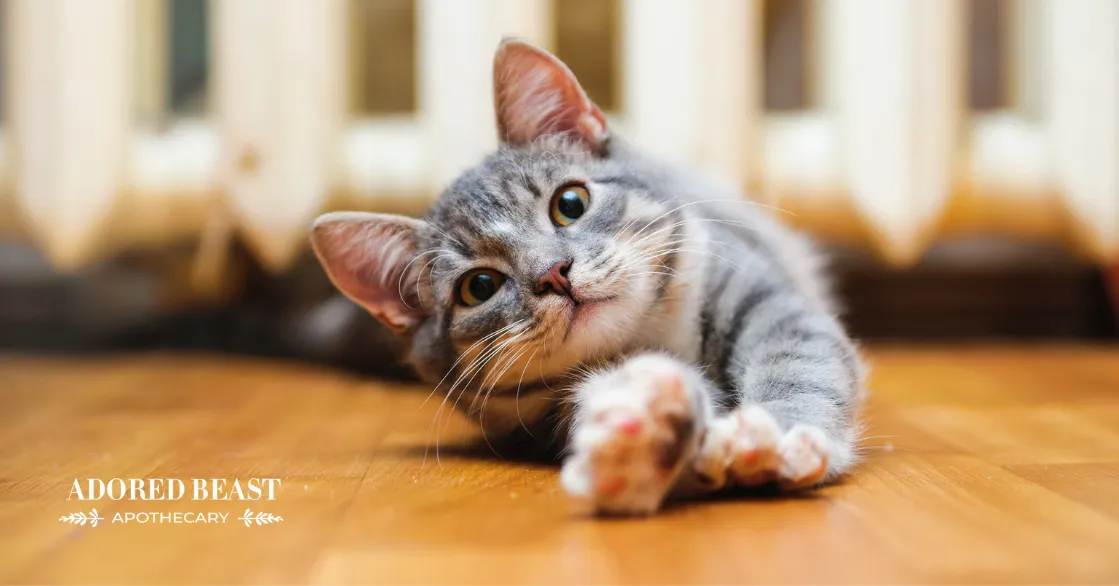A glossy coat and healthy skin are more than just aesthetic perks for your cat—they signal robust overall wellness. As the body’s largest organ, a cat’s skin protects against threats, regulates body temperature, and bolsters immunity. When issues like dryness, itching, flaking, or inflammation arise, natural supplements can provide gentle, internal relief to restore balance.
If your feline is scratching excessively or showing signs of discomfort, exploring skin supplements for cats made from quality, natural sources can make a real difference. These options target root causes like inflammation and allergies, promoting a supple coat without harsh chemicals. In this guide, we’ll cover the top recommendations, backed by veterinary insights and real-world cat care experience.
 Cat with shiny coat benefiting from skin supplements
Cat with shiny coat benefiting from skin supplements
Top Natural Skin Supplements for Cats
Selecting the right supplements involves choosing cat-specific formulas free from contaminants. Always introduce them gradually, starting with small doses mixed into wet food, and consult your vet—especially for cats with pre-existing conditions. Here’s our curated list of proven options.
1. Omega-3 Fatty Acids
Omega-3 fatty acids stand out as essential skin supplements for cats due to their potent anti-inflammatory effects. They calm irritated skin, minimize allergic responses, and strengthen the skin’s natural barrier against dryness and pollutants.
Beyond skin health, omega-3s benefit joints, heart function, kidneys, and brain vitality, making them ideal for senior cats or those with mobility issues. Veterinary studies, such as those from the American Veterinary Medical Association, highlight EPA and DHA’s role in reducing dermatitis symptoms.
Pro Tip: Opt for purified, microalgae-derived sources like Potent-Sea Omega-3, which avoids ocean pollutants. Begin with 1/8 teaspoon daily, adjusting based on your cat’s weight (typically 250-500mg EPA/DHA per 10lbs). Many owners report softer fur within 4-6 weeks.
2. Probiotics
Gut health directly influences skin condition—a concept supported by research in the Journal of Veterinary Internal Medicine. Probiotics balance the microbiome, curb inflammation, enhance nutrient uptake, and alleviate allergy-related itchiness, proving invaluable for cats with food sensitivities.
Feline-formulated blends with strains like Enterococcus faecium thrive in a cat’s acidic stomach. Pairing them with prebiotics amplifies benefits for skin hydration and repair.
Pro Tip: Try Felix’s Flora, featuring cat-specific probiotics plus fulvic acid for detox. Dose at 1/2 scoop daily for a 10lb cat. For deeper insights, check our guide on cat gut health, which links digestion to radiant coats.
3. Coconut Oil
Rich in lauric acid, coconut oil combats bacteria, yeast overgrowth, and flakiness while moisturizing from within. Its medium-chain triglycerides (MCTs) offer anti-inflammatory perks without overwhelming digestion.
Internal Benefits: Supports skin barrier integrity and reduces shedding.
Topical Option: Dab a pea-sized amount on hotspots for quick soothing, if your cat allows.
Pro Tip: Use virgin MCT oil at 1/8 teaspoon per meal for adults. Monitor stool; discontinue if diarrhea occurs. Holistic vets often recommend it for seasonal allergies, with visible improvements in 2-3 weeks.
4. Spirulina
This superfood algae packs protein, antioxidants, and gamma-linolenic acid to detoxify, fight oxidative stress, and promote lustrous fur. It’s particularly helpful for cats recovering from environmental toxin exposure.
Pro Tip: Choose organic spirulina powder; sprinkle 1/16 teaspoon into food initially. Gradually increase to avoid tummy upset. User experiences shared on pet forums echo vet endorsements for its role in allergy management.
5. Chamomile Tea
Chamomile’s mild anti-inflammatory and soothing compounds make it a topical favorite for hotspots and rashes. Cooled tea applications reduce redness without steroids.
Pro Tip: Brew organic, caffeine-free chamomile, cool fully, and apply with a cloth 1-2 times daily. Skip for ragweed-allergic cats. Studies in herbal veterinary texts confirm its safety for short-term use.
Explore natural remedies for cat digestion for complementary support, as digestive balance enhances supplement efficacy.
Honorable Mentions for Optimal Skin Health
Let Cats Be Cats: Encourage safe outdoor exposure or cat grass to build a resilient microbiome. Supervised backyard time introduces beneficial microbes, per microbiome research from Cornell University.
Minimize Baths: Over-bathing strips oils; opt for brushing and wipes instead. This preserves natural sebum, preventing dryness.
For related kidney support in aging cats, see cat food for kidney disease pets at home.
Final Thoughts on Skin Supplements for Cats
Incorporating omega-3s, probiotics, coconut oil, spirulina, and chamomile can transform your cat’s skin and coat health naturally. Combine with a balanced diet, flea prevention, and regular vet check-ups for best results. Patience pays off—most cats show improvements in 4-8 weeks.
Ready to pamper your feline? Start with one supplement, track progress, and consult a holistic vet. Share your success stories in the comments, and explore more cat care tips on our site for vibrant, itch-free living.
